INDIA: Government Masterplan: Kick the Students Out of School
Urikhimbam Jenison
The Manipur state government has closed down all educational institutions in the state in an attempt to curb the ongoing movement for the implementation of the Inner Line Permit System (ILPS) in Manipur. It has been a month since this decision was taken. In other words, students have been kept out of their schools and colleges for a long time already.
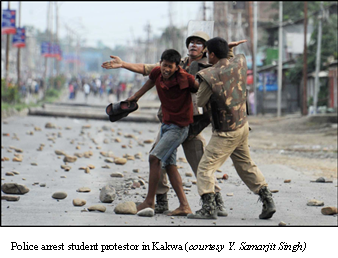 On July 8, Sapam Robinhood, a 16-year-old student studying in the XI standard was killed by police personnel during the crackdown on a peaceful student protest that was led by the Joint Committee on Inner Line Permit System (JCILPS), Student Wing, in Tellipati area of Imphal East. Since then, all the educational institutions have remained closed following the order of the state government. The orders for temporary closure of educational institutions have been issued “in consideration of the physical safety and security of the students of all institutions in Imphal area”.
On July 8, Sapam Robinhood, a 16-year-old student studying in the XI standard was killed by police personnel during the crackdown on a peaceful student protest that was led by the Joint Committee on Inner Line Permit System (JCILPS), Student Wing, in Tellipati area of Imphal East. Since then, all the educational institutions have remained closed following the order of the state government. The orders for temporary closure of educational institutions have been issued “in consideration of the physical safety and security of the students of all institutions in Imphal area”.
This temporary closure of the educational institutions has by now given rise to students fearing losing an academic year and falling behind in their planned careers. Despite many appeals from the teachers, CSOs, parents, and student bodies, the government has not been able to find a solution to the ILPS demand and make a decision to re-open the institutions. Instead, the government has taken to deploying police personnel in all the schools, colleges, and universities.
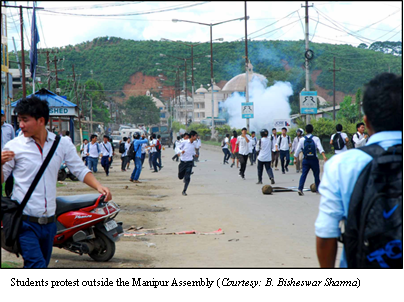 The root cause of this odd situation, wherein students are shut out of schools now packed with police and military personnel, is the government’s attempt to to suppress the movement of the Inner Line Permit System, which has been building for decades. The people living in Manipur genuinely fear that their identity will disappear in the near future if the influx of migrants is not controlled. Manipur non-residents are beginning to outnumber permanent residents in many areas, and also acquire local identity cards, provided by the government for vested interest.
The root cause of this odd situation, wherein students are shut out of schools now packed with police and military personnel, is the government’s attempt to to suppress the movement of the Inner Line Permit System, which has been building for decades. The people living in Manipur genuinely fear that their identity will disappear in the near future if the influx of migrants is not controlled. Manipur non-residents are beginning to outnumber permanent residents in many areas, and also acquire local identity cards, provided by the government for vested interest.
The government passed a bill, titled Manipur Regulation of Visitors, Tenants and Migrant Workers (MRVT&MW) Bill 2015, on 16 March, 2015, which failed to meet the demands of the people and led to a n upswell of protests. This made the movement for the ILPS, led by JCILPS stronger. And, the killing of Sapam Robinhood by the police forced the government to retract. On July 15, the government held an emergency assembly session and a motion was passed to withdraw the Bill, without introducing an alternative, which is not in accord with procedure.
Since Sapam Robinhood’s killing, every nook and corner of state has resounded with the protest. The demand is for implementation of the ILPS and punishment for the officer involved in killing a student who participated in a peaceful protest. Student bodies have taken the step to boycott all governmental departments until their demands are fulfilled by the government. In support of the late Sapam Robinhood, students, CSOs, and social activists across the state have been demanding justice to the victim’s family and implementation of the ILPS.
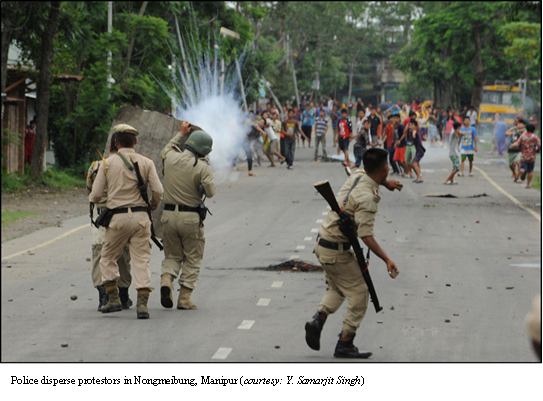 While people living in Manipur have been protesting for the implementation of the Inner Line Permit System, the rest of India has interpreted this as an anti-Indian or anti-mainlander fight, which is an incorrect interpretation. The people of Manipur are seeking that the government protects them from losing their ancestral place, and there is a fear that indigenous Manipuris will become minorities in their own land. It is not that the people want to prevent outsiders from entering Manipur. The fears of the Manipuris have been realized in Tripura, where the Tripuris have became a minority in their own ancestral land.
While people living in Manipur have been protesting for the implementation of the Inner Line Permit System, the rest of India has interpreted this as an anti-Indian or anti-mainlander fight, which is an incorrect interpretation. The people of Manipur are seeking that the government protects them from losing their ancestral place, and there is a fear that indigenous Manipuris will become minorities in their own land. It is not that the people want to prevent outsiders from entering Manipur. The fears of the Manipuris have been realized in Tripura, where the Tripuris have became a minority in their own ancestral land.
The government has been on the back foot since Sapam Robinhood’s killing. And, it is the government’s attempt to regain control that has resulted in the decision to to close down the schools and universities.
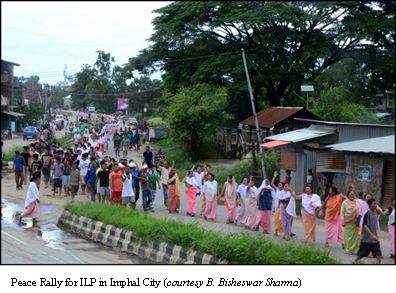 This, however, is not the first time the people, and in particular the students, of Manipur have had to experience of sh ut-down of educational institutions. For instance, institutions were shut in 2001 in relation to the Naga ceasefire, which, in Manipur, resulted in a people uprising. Then again, in 2004 they were closed to try and control the rage following the news of the rape and murder of Thangjam Manorama by Assam Rifles personnel. The year 2009 witnessed the same, following the killing of Rubina, a 7-month pregnant woman, and Sanjit, by police commandoes. And, most recently and something that is ongoing, in 2015, the Dzukou Valley dispute between Manipur and Nagaland is keeping students away from the schools and colleges in the Mao area of Manipur. So, in some sense shutting down schools and universities is standard operating procedure for the government in times of emergencies when poor governance or brutal crimes following by impunity unsettles the population.
This, however, is not the first time the people, and in particular the students, of Manipur have had to experience of sh ut-down of educational institutions. For instance, institutions were shut in 2001 in relation to the Naga ceasefire, which, in Manipur, resulted in a people uprising. Then again, in 2004 they were closed to try and control the rage following the news of the rape and murder of Thangjam Manorama by Assam Rifles personnel. The year 2009 witnessed the same, following the killing of Rubina, a 7-month pregnant woman, and Sanjit, by police commandoes. And, most recently and something that is ongoing, in 2015, the Dzukou Valley dispute between Manipur and Nagaland is keeping students away from the schools and colleges in the Mao area of Manipur. So, in some sense shutting down schools and universities is standard operating procedure for the government in times of emergencies when poor governance or brutal crimes following by impunity unsettles the population.
Following the order of the state government for the temporary closure of institutions, yet another order was issued to deploy police personnel in all the schools, colleges, universities, and other such institutions. And, now police officials deployed in the schools and colleges have taken to misusing the compounds: by playing cards, drinking, and smoking. Some students, who arrived at their respective campuses out of desire that their institutions be reopened, even confronted these officers. The prevailing environment of police personnel camped out in educational institutions has only generated insecurity amongst the students. And, while it is police officials occupying educational institutions in the Imphal City, in the outskirts, it is out and out militarisation, with the Assam Rifles and paramilitary forces having taken over the compounds of schools and colleges.
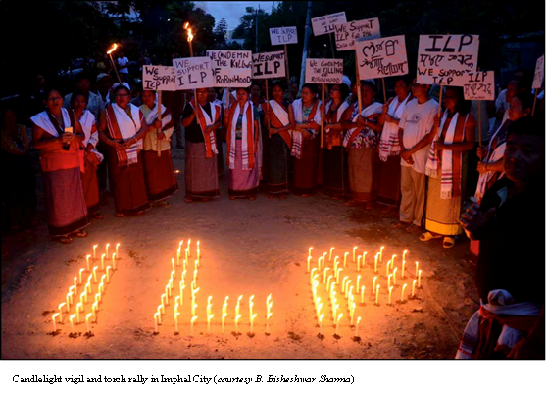 The central and state government have taken no steps to bring this movement and the root conflict to an end. Officials appear intent to only hold onto their chairs. The people of Manipur are grieving at heart, wondering why is it that the state and central government, which has all the power and infrastructure, cannot put an end to the conflict? Who benefits from the continuing conflicts? How long does the government plan to keep the people, the students, under soldier’s boots?
The central and state government have taken no steps to bring this movement and the root conflict to an end. Officials appear intent to only hold onto their chairs. The people of Manipur are grieving at heart, wondering why is it that the state and central government, which has all the power and infrastructure, cannot put an end to the conflict? Who benefits from the continuing conflicts? How long does the government plan to keep the people, the students, under soldier’s boots?
# # #
Mr. Urikhimbam Jenison is Human Rights Activist. He can be contacted aturikhimbam.jenison@ahrc.asia or jeni_u580@yahoo.com



